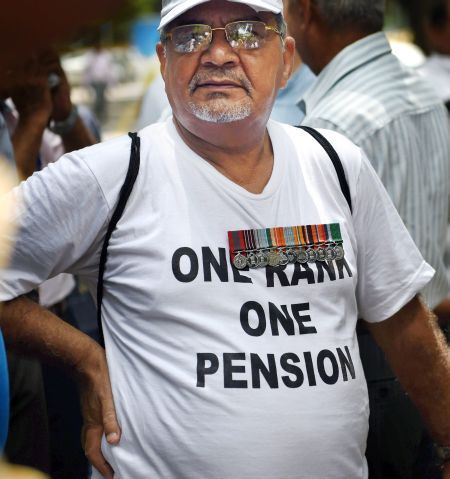 Mrs S P Singh, a tiny, rounded woman with laugh lines at the corners of her eyes, seems an ordinary housewife, on her way to buy groceries from a middle-class marketplace. But this wife of a retired lieutenant colonel from the Sikh regiment has found a new routine, travelling to New Delhi’s Jantar Mantar every morning to join hundreds of others like her, from disparate ex-servicemen’s groups, agitating for “one rank one pension”.
Mrs S P Singh, a tiny, rounded woman with laugh lines at the corners of her eyes, seems an ordinary housewife, on her way to buy groceries from a middle-class marketplace. But this wife of a retired lieutenant colonel from the Sikh regiment has found a new routine, travelling to New Delhi’s Jantar Mantar every morning to join hundreds of others like her, from disparate ex-servicemen’s groups, agitating for “one rank one pension”.
On Tuesday, the public agitation launched on June 6 by the United Front of Ex-Servicemen, completes 100 days.
On September 5, Defence Minister Manohar Parrikar had announced the government’s acceptance of the basic principle of OROP: “That uniform pension be paid to the armed forces personnel retiring in the same rank with the same length of service, regardless of their date of retirement”. But key ex-servicemen’s demands remained unaddressed, and the agitation continues.
Nor are ex-servicemen taking solace from Prime Minister Narendra Modi’s assurances the day after Parrikar accepted OROP. There was little clarity in Modi’s statement, say ex-servicemen, and no official notification has followed.
“We will go on for 1,000 days if needed. The government has tried to create a rift between ex-servicemen by announcing an award that pleases some sections. But we have a culture of fighting together and we will remain united,” says Mrs Singh.
Since Parrikar announced OROP, the mood has only become feistier. Initially spearheaded by officers, the movement has become more broad-based, with even village-based ex-servicemen associations -- composed mainly of rank-and-file former soldiers -- pledging support and sending representatives to Jantar Mantar.
Retired Major General Satbir Singh, the Indian Ex-Servicemen’s Movement chief, who has emerged as the face of the agitation, says the IESM has more than 50,000 members and is now supported by more than 160 ex-servicemen organisations.
According to him, the government’s acceptance of OROP, which will cost Rs 18,000-22,000 crore to implement this year, has seven key shortfalls.
These include the government’s exclusion of servicemen who opt for premature retirement (PMR), before reaching the age of superannuation. On the evening of September 5, Parrikar had done a U-turn, assuring ex-servicemen that those who took PMR would be entitled to OROP. However, this has not yet been officially notified.
Second, ex-servicemen have rejected the government’s offer to “equalise”, or adjust old and new pensions, every five years. Instead, they demand annual “equalisation”.
“The government says annual equalisation will be
Third, ex-servicemen had negotiated that pensions as on March 31, 2014, would be passed on to all pensioners. Yet, Parrikar announced the average pension paid in 2013 would be paid, holding back one full annual increment.
Fourth, Parrikar announced that OROP would be effective from July 1, 2014, not April 1, as had been agreed in negotiations. With each month’s additional pension amounting to Rs 700 crore, the government was looking to save Rs 2,100 crore.
Fifth, Parrikar wants the average of each pay grade to form the basis for calculating pension of that grade. The ex-servicemen are demanding the top of the scale. Sixth, ex-servicemen demand that OROP be “implemented in perpetuity”, with successive pay commissions “integrating”, not “adjudicating” pensions. Finally, Parrikar announced a one-person judicial commission to adjust pension anomalies over the next six months. Ex-servicemen’s groups, however, are demanding a five-member commission, with three of their representatives and one each from the serving military and the defence ministry. This would be disbanded after one month.
Contacted for a comment, defence ministry spokesperson, Sitanshu Kar, responded, “The PM has provided assurances and the ministry is working very hard to produce a notification that will reconcile expectations. This should be out very soon.”
>> Servicemen who retire prematurely should also get pension after completing qualifying service (officers: 20 years; other ranks: 15 years)
>> Old and new pensions should be “equalised” annually, not once every five years as government has announced
>> Date for calculating pensions should be March 31, 2014, not average pension paid in 2013, as Parrikar announced
>> OROP should be effective from April 1, 2014, not July 1, as Parrikar announced. Each soldier would get three months more of enhanced pension
>> Pension for each pay grade should be the maximum pension of that grade, not average of maximum and minimum, as government has announced
>> OROP must be implemented in perpetuity, as a principle. Successive pay commissions could “integrate” pensions, but not “adjudicate” on them
>> Instead of one-person judicial commission to adjust pension anomalies, five-member commission, with three ex-servicemen members











 © 2025
© 2025